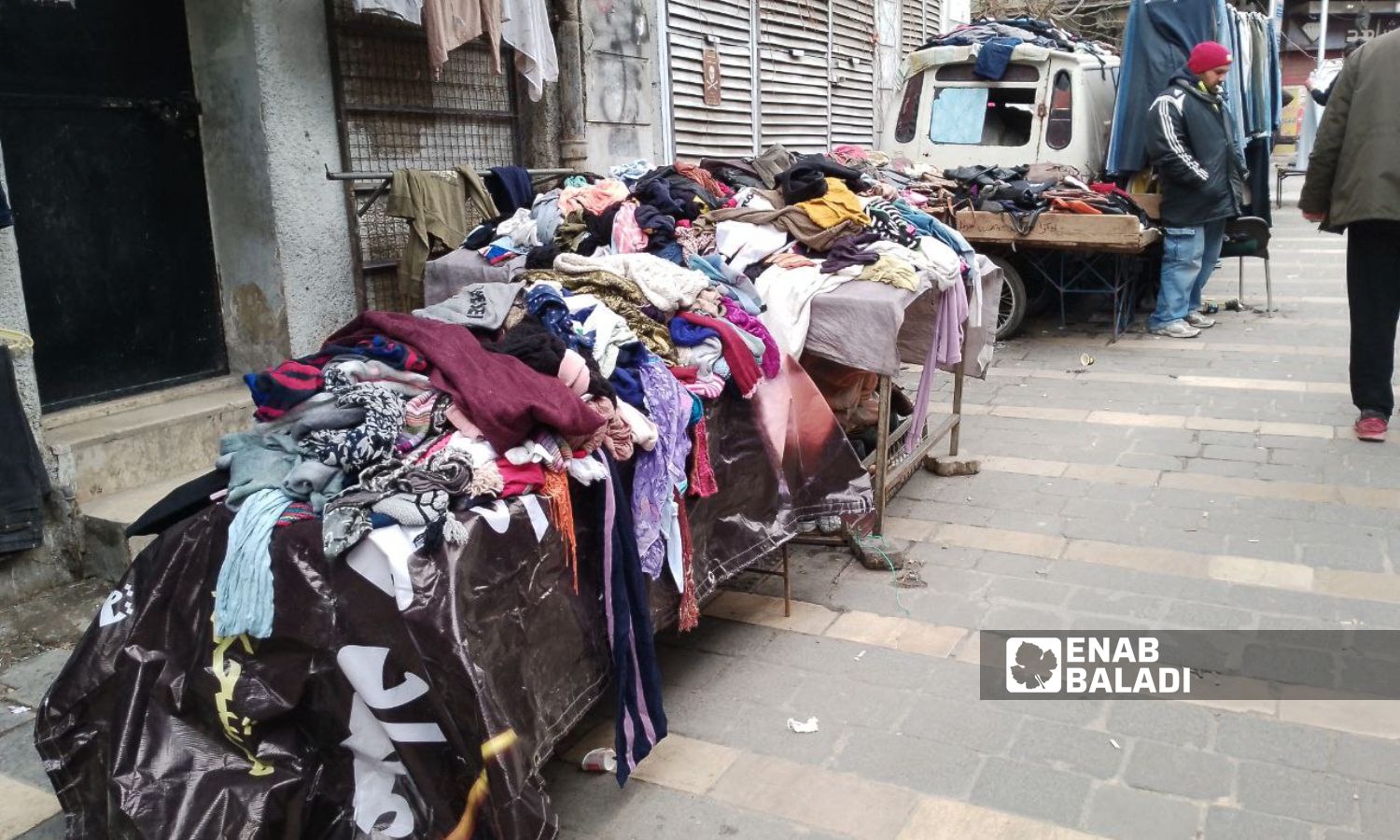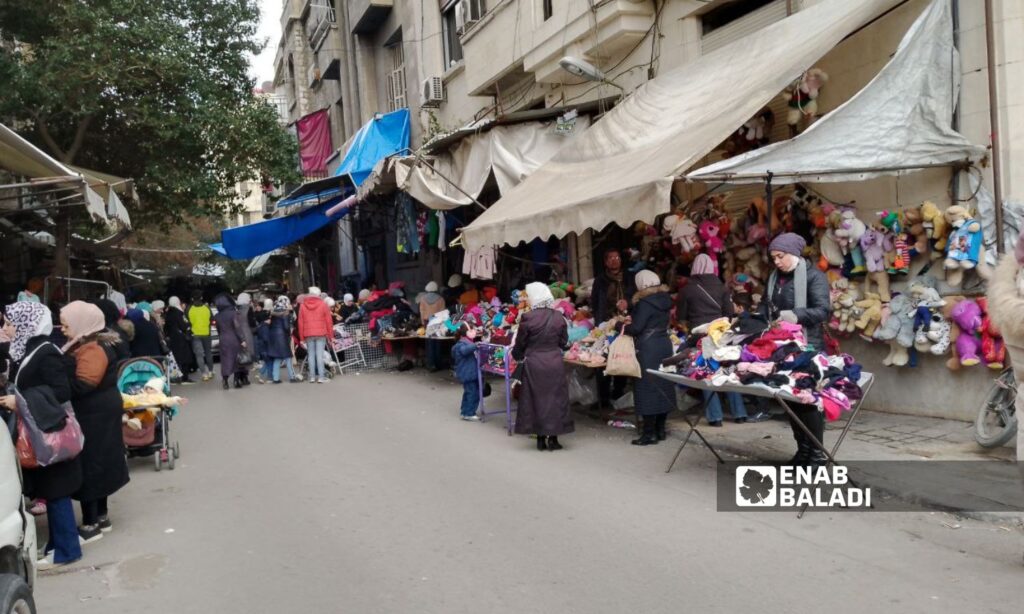“Come over, dear, any pair of jeans for only fifty thousand pounds, come, sir, make your son happy with a pajama set for just forty thousand pounds,” are phrases repeated to passers-by between street stalls, launched by the sellers to attract customers and showcase the various models and colors they sell.
Some families in Damascus resort to buying their clothes from street vendors spread along the roadsides, which are considered the cheapest haven, as their selling prices are suitable for people with limited income.
The prices at the stalls are competitive with the prices of clothes in commercial shops in Damascus, where prices have increased by about 200% compared to last year.
These stalls have taken up space in each area, starting from al-Daraweesh street up to al-Hamidiyah market and Bab Sreijeh, and from al-Salihiyah market to al-Hamra street, where the prices of clothes are about 80% lower than those in commercial shops.
According to a tour conducted by Enab Baladi in these markets, they witness a significant turnout despite the unsuitable or poor quality, due to the difficult economic conditions that the residents suffer from and the decline in purchasing power.

Shops and stalls selling second-hand clothes in al-Qanawat district in Damascus – February 3, 2024 (Enab Baladi/Sarah al-Ahmad)
Lower quality but better price
Sawsan (37 years old) from al-Muhajreen district in Damascus, mother of two, told Enab Baladi that for about three years she has not bought a single piece of clothing from commercial shops in Damascus, and instead, she resorts to buying from street stalls throughout the city.
The salary of Sawsan’s husband reaches 300,000 Syrian pounds, which is not enough to buy a small child’s coat; the price of the coat ranges between 250,000 and 400,000 pounds, while it does not exceed 60,000 pounds at the street stalls.
Sawsan explained that the quality of the clothes she buys from the stalls does not match that of the shops, but the living situation requires her to look for cheaper options.
Ghassan (53 years old) from al-Baramkeh district in Damascus, father of four, told Enab Baladi that he can no longer clothe himself and his family from commercial stores, as his salary does not exceed 350,000 Syrian pounds.
For about two years, Ghassan has not bought any piece of clothing for himself, but his wife buys clothes for herself and their children from various stalls, depending on who offers a better price after bargaining.
He explained that the stalls sell clothing of poor quality, most of which are “stock” (stored clothes for a long time or with a defect), but their prices are suitable for many, like a women’s pajama set for 45,000 pounds, while its price in stores is approximately 600,000 pounds.
The minimum government wage in Syria amounts to 278,910 Syrian pounds per month, after the latest increase on February 5, and the minimum wage corresponds to about $19.30, according to the S-P Today website specialized in exchange rates.
Residents also buy men’s and women’s underwear from the stalls “despite its poor quality,” as the price of a piece does not exceed 12,000 pounds, while it is sold in commercial stores for about 50,000 pounds per piece.
Shops and stalls selling clothing in al-Qanawat district in Damascus – February 3, 2024 (Enab Baladi/Sarah al-Ahmad)
The stall does not require expenses
Ali (44 years old) from the city of Quneitra, and the owner of a clothing stall in Damascus, told Enab Baladi that the difference between commercial stores and street stalls lies in the quality of clothing, in addition to the fact that stall owners accept low profits.
Commercial stores also need to pay for labor and fuel for generators and pay taxes, while a stall does not require any expenses at all.
Despite the low quality of the clothing, considering it to be local third-grade manufacturing, its prices are in line with the income of individuals in Syria. Also, they are sold at low prices on the understanding that shop owners prefer not to display them due to their long accumulation, so they become the share of street stalls.
Ali added that despite the security patrols’ crackdown on removing stalls “for fear of affecting the public appearance of Damascus,” he returns every time and continues his work.
Shops and stalls selling clothing in al-Qanawat district in Damascus – February 3, 2024 (Enab Baladi/Sarah al-Ahmad)
Repeated campaigns
The governorate conducts repeated campaigns to remove street stalls, but these campaigns have not prevented the vendors from continuing their work, and their voices still call for purchases on every pavement, with only their merchandise changing each season.
Days after the campaign carried out by the governorate to remove the street stalls that filled the city’s sidewalks, and their complete removal in June 2023, the stalls returned to expand, taking over the sidewalks once again and causing traffic congestion, according to what was reported by the local newspaper, Al-Watan.
According to al-Watan, vendors state that they have no choice but to return to work in the same places.
It mentioned that while the presence of stalls in areas crowded with pedestrians causes obstruction of movement and occupation of sidewalks, the solution will not lie in their removal and leaving their owners prey to hunger, but in securing designated places for them to work and sell their products legally. Without this, their return to the same places will be perpetuated.
Used clothes market in the Itfaiyeh neighborhood in Damascus – February 3, 2024 (Enab Baladi/Sarah al-Ahmad)











